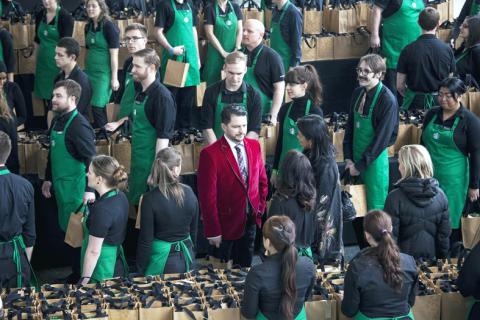Starbucks Corp plans to turn more of its US cafes into spots for beer and wine in the evenings.
The US-based global coffee company says it is looking to expand alcohol sales to “thousands of select stores” over the next several years, although it did not provide details on an exact timeline.
The chain first offered beer and wine after 4pm at one of its Seattle cafes in 2010. The drinks are now in about 26 cafes, with plans to reach 40 by the end of the year. The cafes with alcohol also serve a variety of small dishes, such as bacon-wrapped dates and flatbreads.

Photo: Reuters
It’s part of Starbucks’ push to boost sales after the morning rush hour. It is a common concept in the restaurant industry — figuring out ways to maximize sales throughout the day, since stores have to pay for rent and labor anyway.
US fast-food restaurant Taco Bell, for instance, recently started highlighting snacks in its ads to drive sales during the slower late afternoon hours. And the fruit shakes and other drinks at McDonald’s are seen as a way to attract people throughout the day.
As for Starbucks, the chain recently introduced new sandwiches and salads to boost sales in the afternoon. It is also branching out into other areas as it faces more competition in the coffee market.
The company recently purchased a chain of tea shops called Teavana. CEO Howard Schultz has said he wants to make tea as popular in the US as he has helped make coffee.
There are about 11,000 Starbucks stores in the US and about 285 in Taiwan.

On Ireland’s blustery western seaboard, researchers are gleefully flying giant kites — not for fun, but in the hope of generating renewable electricity and sparking a “revolution” in wind energy. “We use a kite to capture the wind and a generator at the bottom of it that captures the power,” said Padraic Doherty of Kitepower, the Dutch firm behind the venture. At its test site in operation since September 2023 near the small town of Bangor Erris, the team transports the vast 60-square-meter kite from a hangar across the lunar-like bogland to a generator. The kite is then attached by a

Foxconn Technology Co (鴻準精密), a metal casing supplier owned by Hon Hai Precision Industry Co (鴻海精密), yesterday announced plans to invest US$1 billion in the US over the next decade as part of its business transformation strategy. The Apple Inc supplier said in a statement that its board approved the investment on Thursday, as part of a transformation strategy focused on precision mold development, smart manufacturing, robotics and advanced automation. The strategy would have a strong emphasis on artificial intelligence (AI), the company added. The company said it aims to build a flexible, intelligent production ecosystem to boost competitiveness and sustainability. Foxconn

Leading Taiwanese bicycle brands Giant Manufacturing Co (巨大機械) and Merida Industry Co (美利達工業) on Sunday said that they have adopted measures to mitigate the impact of the tariff policies of US President Donald Trump’s administration. The US announced at the beginning of this month that it would impose a 20 percent tariff on imported goods made in Taiwan, effective on Thursday last week. The tariff would be added to other pre-existing most-favored-nation duties and industry-specific trade remedy levy, which would bring the overall tariff on Taiwan-made bicycles to between 25.5 percent and 31 percent. However, Giant did not seem too perturbed by the

TARIFF CONCERNS: Semiconductor suppliers are tempering expectations for the traditionally strong third quarter, citing US tariff uncertainty and a stronger NT dollar Several Taiwanese semiconductor suppliers are taking a cautious view of the third quarter — typically a peak season for the industry — citing uncertainty over US tariffs and the stronger New Taiwan dollar. Smartphone chip designer MediaTek Inc (聯發科技) said that customers accelerated orders in the first half of the year to avoid potential tariffs threatened by US President Donald Trump’s administration. As a result, it anticipates weaker-than-usual peak-season demand in the third quarter. The US tariff plan, announced on April 2, initially proposed a 32 percent duty on Taiwanese goods. Its implementation was postponed by 90 days to July 9, then